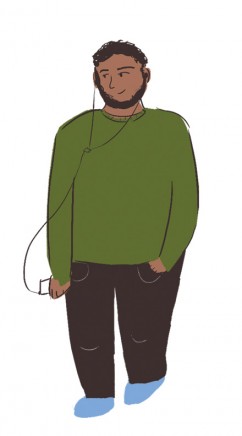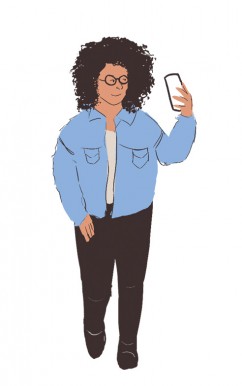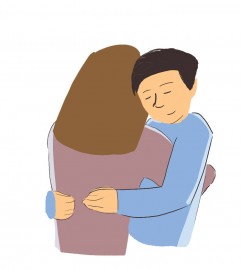Five months later
A third-year discusses mental health and why he hasn’t had sex in five months
By Avneet Sharma
I haven’t had sex in five months. No, I don’t want pity, and I don’t think of it as a big deal. It’s simply a matter of fact. To be honest, it never occurred to me until I started thinking about it.
Part of the reason I haven’t had sex is that one of the side-effects of my medication involves a decrease of my sex drive, although my sex drive is already low on average. The other part is that I find myself making a decision, almost subconsciously, to only pursue sex with someone I can connect with on a deep personal level.
I’m not looking for ‘the one’ or anything like that. I’m far too cynical to believe in the concept that there is a perfect person out there for me, nor do I believe that I will find this supposed perfect person in my early 20s. I guess I’m looking for a relationship.
One of my biggest priorities lately has been my mental health. I’ve taken time this summer to focus on my health, well-being, and becoming a happier person in general. For the most part, I feel a lot more confident in myself. I want to reach a point where I don’t need a relationship, but want a relationship.
The most difficult part about stating this is that I’m currently tip-toeing the fine line between being hopeful and being desperate, and I’m trying my best to be the former. I have felt a certain pressure, especially within the gay community, to pursue casual or anonymous sex. It has become something of a rite of passage for young gay men to download Grindr, a hookup app for queer men, and pursue a no-strings-attached sexual encounter with an older man.
I did this a few months into my first year. One night, I was drunkenly messaging a guy on Grindr who wanted me to come over to his bizarre apartment in Harbord Village. My most vivid memory of the night was how strange and uncomfortable I felt in his windowless bedroom with a ceiling that curved too low above his bed. It didn’t help that he was wearing cheap Old Navy flip-flops.
It was then that I realized I don’t like having sex for the sake of having sex. The fun and excitement of my sexual encounters in the past have been with people who I have known for a while and had a palpable connection with.
Does waiting for a connection before having sex make me too much of an idealist? It has been five months, but I’m not too concerned about whether it will happen again soon. Sometimes, I do have those moments of weakness where I think about speeding through the process, fixating on one guy and trying to create a connection artificially. I also start to wonder if my expectations are too high and if I should just settle for any guy who is remotely interested in me, even if it’s just an anonymous hookup.
I say this to emphasize that I am nowhere near perfect. I have moments of weakness, self-consciousness, and desperation. But when it comes to something as personal as sex, it’s important to really think about what you want in an honest and realistic manner. And remember that if you aren’t having sex now, it doesn’t have to mean anything.
Will you be my metamour?
A student reflects on the intricacy and beauty of polyamory
By Vanessa Perruzza
“So, you’re polygamous?” the white boy asks me, nursing a watery beer and staring at me with inquiring eyes.
“No, that’s when one man takes many wives. I am not a man, nor am I married. I don’t practice polyandry either, which is one woman with many husbands,” I explain, tired of the same, overly simplistic explanations.
“But you said—”
“What I said was: I am polyamorous. You know? ‘Poly’ as in many? ‘Amour’ as in love? My partner and I can have other relationships in a safe and consensual way.”
It’s a conversation I’ve had countless times, and every person in a monogamous relationship has had a similar response. I distinctly recall a heated argument during Nuit Blanche a few years ago, in the very beginning of my current relationship, that truly tested my patience.
“If your boyfriend has another girlfriend, then he obviously doesn’t love you. If he loved you for real, you’d be enough for him,” someone told me. Using self-restraint that I’m still proud of to this day, I simply walked away.
Polyamory is an inconceivably gorgeous thing. Love, when it is pure and unselfish, is life-giving and wonderful. Still, many monogamous people find me dirty and selfish, when all I want to do is share the love I have.
Unlike an open relationship, where there are often no-holds-barred interactions with people outside the relationship, polyamory is more complicated and communicative. A polyamorous couple, triad, or constellation — which is an interconnected web of partners — will always communicate their needs, expectations, and limits in an open and honest way. This helps to avoid feelings of jealousy and resentment that often destroy both monogamous and open relationships.
Truly though, one of the most beautiful parts of polyamory — the part that often goes forgotten — are the metamours. That is, the partner of your partner.
In a monogamous relationship, the partner of your partner is a homewrecker. In an open relationship, the partner of your partner is a jealousy-inducing stranger. But in polyamory, the partner of your partner is the most intimate of friends; the person you can trust to have your lover’s best interests at heart, and with whom you can share things you can’t share with anyone else.
Think girl talk, but on steroids. When metamours meet, and have a good relationship, the support between them is unparalleled. In my own experience, conversations between metamours are some of the funniest you’ll overhear.
“He never used to bite before. Did he learn biting from you? Look at this bruise! I love it!”
“You’re one to talk! Was that tongue-thing your doing? Because, wow!”
Beyond sharing intimacy, having someone to care for your partner as much as you do is beautiful and it makes the stupid comments worth the trouble. If they’re sick or suffering, love is on all sides. To me, this is the best part of polyamory: I’m getting love in more way than one.
Romance, of the virtual kind
What four Tinder dates taught a student about modern human interaction
By Sonali Gill
Finding love is never easy. This little nugget of wisdom is as true today as it was 50 years ago.
Given that we live in a digital age, however, the questions surrounding love and sex have been redefined. We are increasingly relying on technology in all aspects of our lives, which is evident in the proliferation of mobile applications. Because of this I find myself asking the question: does technology improve or destroy our love lives?
My experiences with a variety of online dating apps indicate the latter. To prove my point, I am going to tell my story. To paraphrase Charles Dickens: a tale of one city and three dates.
I was unprepared for the events of Date Number One. After some heavily erotic flirting on Tinder, I met a well-built young man who was part-Iranian and part-Japanese. The awkward conversation came in stark contrast to the significant amount of build-up we experienced virtually. I extended my hand to shake his, which was decidedly unromantic, and an internal war raged inside my head: What does he want? Do we sleep together after we get coffee or before? Do we have to sleep together at all?
To myself, I marvelled at all the people who found their soulmates online. I felt like online courting lacked the spontaneity that a real-life, at-the-bar opportunity, naturally oozed. I also found that it was difficult to set boundaries, physically speaking, with someone I had just met. The pressure was ramped up in a situation that was intended as enjoyable.
While searching for Date Number Two, I got the distinct feeling that I was catalogue shopping on an Amazon-like platform. Going through the profiles of various boys on Tinder greatly resembled flipping through the features of an online catalogue of electronics or clothing. Once again, I was unprepared for the deluge of information that I received from some boys, all of which reeked of desperation. Unsurprisingly, the date didn’t go well.
After the first two disasters, I was certain the worst was over. And, for the most part, it was.
Date Number Three took place at a quaint pub somewhere on campus. I had been careful to avoid any erotic exchanges on Tinder to ensure that the bar wasn’t set high. My date was polite and instigated conversation on topics of mutual interest. We connected intellectually, but I still felt no spark. This date led me to believe that it’s probably better to go to a pub or a club if you want a raunchy night out.
The fact that even the third date didn’t go well served as testament to the hit-and-miss of online dating. When dating online, there’s massive potential to mislead people, given that people tend to portray what they think needs to be said rather than what they want to express. The chances of miscommunication are high since most online daters are busy misinterpreting emojis and punctuation marks. Therefore, it’s best to start conservatively and maintain caution in all virtual romance.
Online dating provides us with more choices than ever before which is both a strength and a weakness. The weaknesses of using technology in our romantic lives outweigh the strengths. Romances should have a solid, real-world beginning with minimum opportunities for deception, no matter what their eventual fate may be.
The breakup
How heartbreak was experienced from the ending of a friendship
By Gabrielle Warren
Music albums are powerful. There comes a moment when albums deviate from their original meaning and somehow mould to your life; they become one with an experience or a period of time.
For me, A Seat at the Table by Solange was one of those albums. When it first came out, I didn’t know what its full significance would be. While the entire album encompasses me, one of its most important features was helping me navigate through a breakup.
University is a difficult period. It’s a time when so many things are changing and you are constantly learning about yourself. In Freshman year, I broke up with one of the first people I might have loved. In sophomore year, I broke up with a person I considered a very close friend.
In retrospect, it was the friendship that impacted me most. Even to this day, I have a strong reaction when I think of that time. Everyone wants to talk about romantic breakups. There are whole genres dedicated to the topic of falling in and out of romantic love but few speak about what it means to fall out of love with a friend. Perhaps it’s because it hurts more. To write about it would mean you would have to encounter it.
Friendship is a slow burn. A flame that only gets stronger each interaction. A burn that moves beyond the mental and reaches the spiritual. Romance can exist without friendship, but friendship cannot exist without itself.
I believe that it is the spiritual nature of friendship that makes that breakup hurt more. The exchange of life experiences means that there is a human who holds a piece of who you are. Even when you are torn apart by circumstance — they’ll always hold you.
A month before the official breaking point, I began to feel a disconnect. When we talked, the subjects hadn’t changed but the spirit had. My mind wandered toward other things and people. The glee of our get-togethers had faded. Now silence and apathy filled the space that joy once occupied. The feeling was mutual.
It was late at night. My nose was running. I was stressed for a test I had the next week. A notification popped on my screen. As I began to read, frustration turned into anger. The content of the text included things that needed to be said, things I knew to be true, and things that could not be taken back.
I began to play “Mad.” Solange crooned in my ear, “You got the light, count it all joy. You got the right to be mad. But when you carry it alone you find it only getting in the way. They say you gotta let it go.”
After the song finished, I stared at the long message. I didn’t know what to do. Could we still be friends after this? Some things are better left unsaid. Where could we go from this point?
“Where Do We Go” began to play; it was as if Solange herself was with me, asking the same questions I was thinking: “And I don’t know where to go. No, I don’t know where to stay. Don’t know where to go. And I don’t know where to stay. Where do we go from here? Do you know? Where do we go from here?”
When the song ended, I found some strength. I responded to her text. It was difficult and long. I apologized if I had been a bad friend and claimed I needed time. In reality, I knew that those things that had been said would always be a wall between us. A wall that would cause insecurity and mistrust. I didn’t want that for them or for myself.
Finally, “Don’t Wish Me Well” began to play. Like a song at the end of an emotional movie, it reassured me: “And I’m going all the way. But I’ll leave on the lights for you…I’m going all the way. And now you’re almost out of view.” That moment felt like the end of a sitcom. A sense of sadness that something so beloved would not return, but also a sense of relief that we can move on to new stories.






